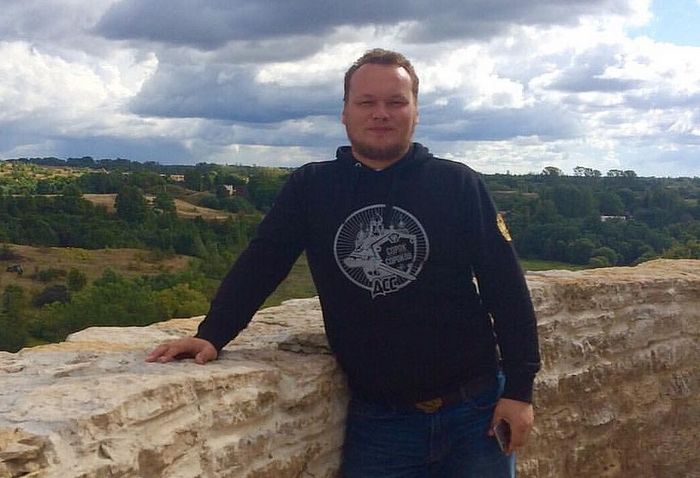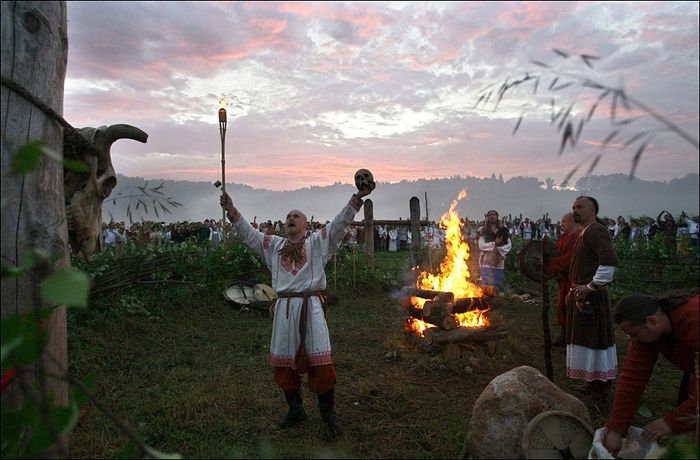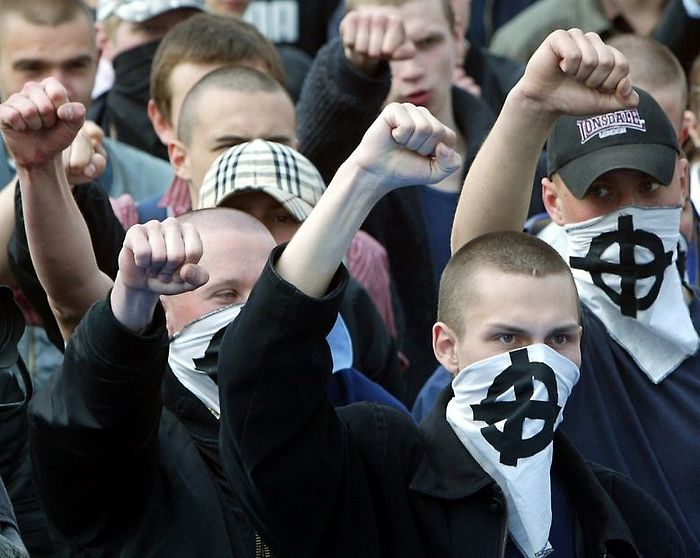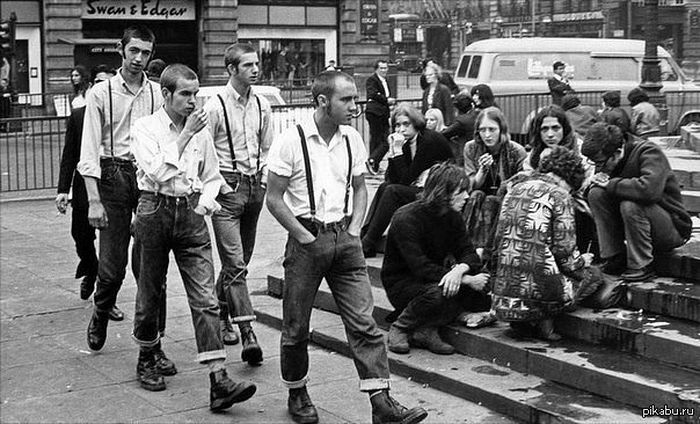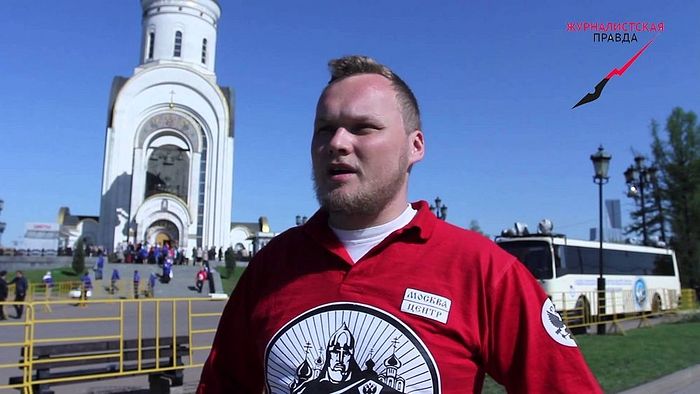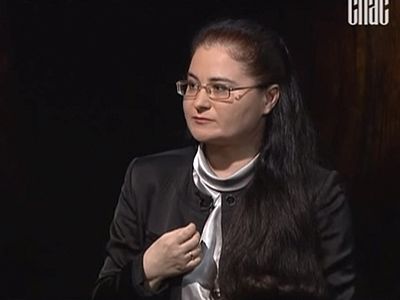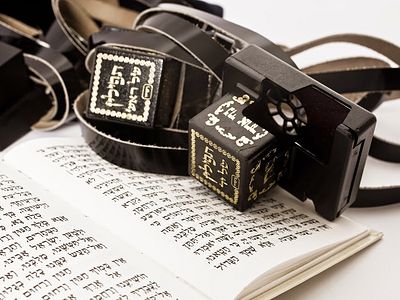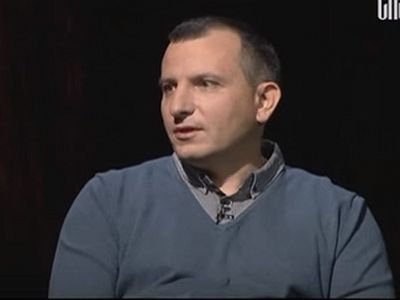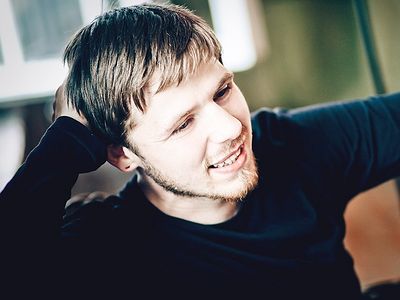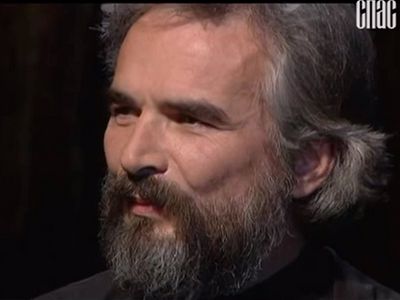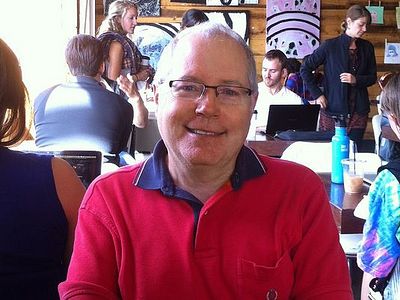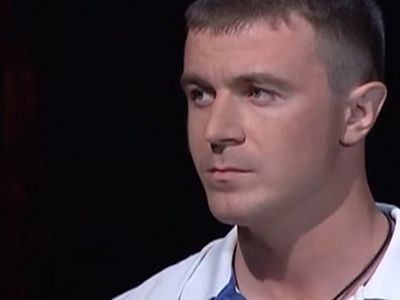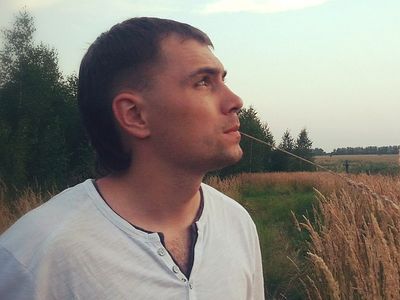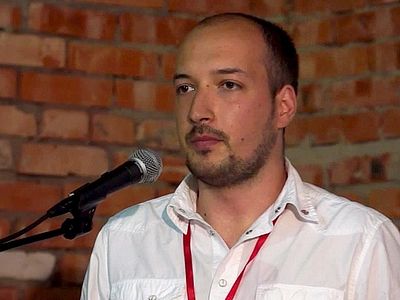We continue to publish the materials of Spas TV program, My Path To God, where Priest George Maximov interviews people who converted to Orthodoxy after searching for the truth for a long time. Today the guest of Father George’s program is Ivan Katanayev, a former leader of skinheads and soccer fans and currently an active participant of Sorok Sorokov movement. Why do patriotic young men turn into followers of Nazi ideology? What is the difference between Russian and European skinheads? What makes Neo-Paganism attractive to soccer fans? Is it easy to overcome prejudice toward Christianity? Do we need to preach Christianity in the streets? These are the topics of the interview with Ivan Katanayev.
Priest George Maximov: Hello. You’re watching My Path to God. The guest of today’s program used to be a member of the skinhead movement. However before we discuss this period of his life, it would be good if we could hear about what happened before that. Please tell us how it all started, Ivan.
Ivan Katanayev: I was born in the summer of 1983 in a regular family of Soviet intellectuals. All my parents and grandparents had higher education. My father had a Ph.D. in Physics and Mathematics. Our family was miles away from Church and God. Like flashes from my childhood memories, I remember those few occasions when my grandmother took me to church with her. When I was a schoolboy, we all went to church on Easter to bless the Easter cakes. That was all my Church-related experience.
In school, we were told about the Russian military victories and space flights, but in the streets I saw squalor and poverty.
Then the Soviet Union started to break up. My school was very good and the teachers were excellent. In the 1990-s, when I was in Grade 6 or 7, I felt that there was a sharp dissonance between the things we were taught at school and the things we saw in the streets. Our school was located downtown, opposite the Tretyakov Gallery. We regularly went to the gallery and other museums. We were told about our great achievements, military victories and space flights, but when I went out in street, I saw squalor and poverty. I felt very bad about it, because as far back as I can remember, I was always concerned about the fate of our country and its people. I didn’t understand what was happening with my country… After classes, my friends and I used to go for a walk downtown. At that time, the situation with ideology was outrageous. For example, many Nazi books were sold near the Museum of History, almost right on the Red Square. In those books, the problems were explained through an outright anti-Semitic rhetoric. They sounded quite convincing for teenagers: “Look at the people in our government. Look who is in charge of the ministries. Look who is ruling this country. Look at the bankers.” And indeed you see that there are practically no people with Russian surnames there. At that time, even the word “Russian” was furtively forbidden. I started reading such books and they resonated well with me.
When I got older, I got interested in soccer. At that time, all Russian soccer fans were skinheads, because everything that was happening in the country in mid-1990-s, including the war in Chechnya and terrorist attacks in Moscow, contributed to making the young people feel that way. There were a lot of people like me at the time. Little by little, I became a part of the nationalistic movement. Unfortunately, there was no one around me at the time who could have steered me in a different direction. The voice of Church was not heard at all. I, for one, didn’t hear it.
I graduated from school in 1999, went to college and became very involved in the soccer fan movement and propaganda of the above ideas.
Father George: Were there any disputes in the family? Did your parents know about your activities?
Ivan Katanayev: Well, my parents talked to me every day. I behaved quite adequately, but my understanding of patriotism was simply perverted. I got involved in all of this because I sincerely loved my country. My parents saw that I was not doing anything crazy or trying to run away, so we didn’t have any big disputes. Naturally, they didn’t like the fact that I was into soccer and that I went away with friends for long periods and occasionally came home with some injuries. However, in general I was a healthy young man who was able to defend himself. I was a master of sports in swimming and attended training sessions six days a week. I was very healthy and of course my energy needed some outlet, which I found in street fighting.
Somewhere in the early 2000-s, certain elements of Neo-Paganism began to manifest in this nationalistic movement. I participated in that too, and attended several Neo-Pagan festivals held outside of the city.
Father George: How serious was all that?
Eye-catching pictures, cult of strength and manliness—this was what made Neo-Paganism attractive.
Ivan Katanayev: Frankly speaking, nobody understood the ideological part of it. It was all limited to slogans like “We are for the Russian gods, Glory to our ancestors!” Nobody really cared who those “Russian gods” were and what was all that about. Eye-catching pictures, the cult of strength and masculinity—this was what made Neo-Paganism attractive. Attending those festivals was like going hiking for us. We would take our backpacks, put up a tent, make barbeque, have a drink with friends, swim in the river… In the evening, there would be a big fire by some wooden idol and people would be passing the cup with mead around. For me it was like being a part of some kind of nice and strange tale. All my friends were into it. Neo-Pagan clichés depicting Christ as a Jewish God who was made up and popularized by Jews contributed to this interest.
Naturally, I had a lot of such prejudices and self-deceptions. Before you can wink an eye, they form a thick wall that is very difficult to break down. No arguments that I myself bring up now when I talk to Pagans are getting through to them. It is very difficult to break through that wall. When you make even a small hole in it, the wall comes down very quickly, but it is very difficult to make that first small hole. At that time, I was a self-confident, prideful, well-built guy who didn’t need anybody’s advice. That wall divided the people into “us” and “them”.
Neo-Paganism is loyal to satanism, because satan is the one who is fighting against the “Jewish God”. So for pagans, satan is an ally.
It should be noted that paganism has absolutely nothing against satanism. Now I realize that all those communications with Perun, Veles and other gods were in fact communications with evil spirits and demons, but at that time I didn’t understand it. There were people in the movement who held satanic views. They wore upside down crosses and satanic pentagrams, some even had satanic nicknames. Nobody in our community really minded that. Why? Because who is satan according to pagans? Satan is the one who is fighting against this “Jewish God” from those fairy tales that the Jews keep telling people around the world. “If satan is fighting Him, that means that satan is our ally,” this is the neo-pagans’ logic.
Father George: What made you quit the skinhead movement?
Ivan Katanayev: In early 2000s, I frequently flew to London, England where I met the founders of the world skinhead movement. I should say that initially, when skinheads appeared in 1960s, this movement did not have any political leanings. They were simply hanging out, just like rockers, bikers, and hippies, but they had their own music, emblems, and other paraphernalia. This movement became political only in late 1980s. This happened in England and one of the founders of this change was Ian Stuart Donaldson, who was also a founder of a legendary band. This Englishman steered a part of the skinhead movement in the far-right direction. An organization called Blood and Honour was created. The name of this organization came from the SS troops.1 This organization quickly spread all over the world. It had a chapter in Russia where I was a member. As I frequently went to England; I met many people who were the founders of the movement or knew them, including Donaldson who died in 1994 in a car crash. In 2004, a huge festival was organized in England to commemorate the tenth anniversary of his death. People from all over the world were invited. Not just any people, but leaders of local skinhead movements, that is, not just ordinary members but those who held certain positions in their countries.
Three people from Russia, including myself, went there. I was 21 then. The event was held near Birmingham, in a town few hours away from London with a population of 5,000 people. So 2,000 heavyset, well-built, tattoo-covered skinheads came and spent two days there at a non-stop concert. The police surrounded the entire grounds but didn’t come closer to prevent any provocations. In general, nothing criminal was going on there, everybody was drinking beer, listening to music, talking, etc. When I got a close-up view of the people who we looked up to... People whose discs and pictures we copied… There was no Internet then, so those rare pictures and magazines were passed from hand to hand. They looked so impressive: they all were so strong and handsome. But when I saw that up close….
Father George: You were disappointed?
European skinheads are losers. All they want is to drink beer, listen to music and have a drunken brawl.
Ivan Katanayev: That’s putting it mildly. It should be noted that at that time the average age of Russian skinheads or soccer fans was around 20-25 years. In Europe, where all this started earlier, the average age of the members was probably 35-40. The founders were pushing their fifties. At that time, when I came across all this that we were pursuing then and looked around and talked to people, I understood that there was no truth in it, they were downright losers who hadn’t and wouldn’t achieve anything in life. Where was that political struggle, or those revolutions that we were fantasizing about? That was out of the question; nobody wanted anything. Drinking beer, listening to music and having drunken brawls was the maximum that these people were up to. This really sobered me up. After I saw this, I realized that if we continued doing this in Russia, we would end up just like them: we would get old and have no family or children, just like these people had absolutely nothing. That is why, after I came back to Russia, I started gradually distancing from that movement. I really lost any interest in it.
Father George: Many people have difficulty breaking with the past. How was it in your case?
Ivan Katanayev: Indeed, it is very difficult to make the 180-degree turn right away. It is very difficult to change your way of life so drastically, because all your life, your friends and social circles are connected in one way or another. Those outward trappings—clothes, tattoos… I know people with huge swastika tattoos. What should they do? Just say that they were wrong and realized it when they turned 30? It is difficult to do and not everybody is ready to do it. I know people who wear long-sleeved shirts even on the beach because they have many tattoos like that and they are ashamed of them, even though these people repented a long time ago and became religious. Some are only on the way to becoming religious. However, cutting the ties with your old life abruptly is quite difficult because there are too many anchors that people tied themselves to and these anchors hold them down and prevent them from doing it. In addition, your friends simply wouldn’t understand it. If you try to explain it to them, your arguments will be bouncing off that wall that they built around themselves. It is quite difficult.
I gradually started distancing myself from all that and returning to the Russian classics. I got interested in Russian philosophy. For example, Tikhomirov, Berdyayev, Ilyin, Danilevsky. At that time, I wasn’t even reading the whole books, just some quotes, extracts, and articles that I came across. What were our Slavophiles writing about? They wrote about the principle of Orthodoxy, saying that the uniqueness of our country must be based on the Orthodox faith. After reading about that, I thought that if it was so, then I had to figure out what Orthodoxy was. I started looking for information about it. At first, I simply browsed the Internet.
Father George: Was there any internal resistance caused by the inertia of those Pagan anti-Christian paradigms?
Ivan Katanayev: I didn’t have any contradictions like that at all, because as I said earlier, that wall of myths, fantasies and blatant lies and self-deception fell down as soon as I removed one brick only. When I understood that all that I was into was pure nonsense, another question arose: “Where is the truth?” So I started looking for the truth. At that time, it was very important for me to find the proof of the authenticity of the Bible and biblical events. I was looking for descriptions of archeological artifacts and scientific articles. At that time, the spiritual component was not that important, I had to understand that Christ really existed and that He is God, Our Lord. I needed proof, so I was looking for it. Frankly speaking, I had no faith. I was interested in Orthodoxy, but believing in God… I had no understanding whatsoever what was God. Then I came across the speech by Kirill, the Metropolitan of Smolensk and Kaliningrad. He is now His Holliness, Patriarch of Moscow and all Russia. That was when for the first time I heard a person of this stature say “Russians”, “Russian country”, “Russia”… I don’t remember what the speech was about, but it was a very patriotic speech about the revival of the people! And I started listening, trying not to miss his speeches, looking them up on YouTube.
I started uploading Metropolitan Kirill’s speeches to the fan site. There was so much aggression in the comments!
Moreover, I had a very popular blog on Spartak soccer team’s fan site. 5,000-10,000 people visited it per day. I was in charge of that blog, because I was one of the leaders of the Spartak fan movement. So, I started uploading Metropolitan Kirill’s speeches there. The soccer fans are far from being religious. I never saw church-going people among them the whole time… May be there were people like that, but they kept a low profile, so at that time I didn’t know anybody like that. So, I started uploading these speeches, which were met with strong antagonism in the comments. It went so far that I simply turned the comments off and started uploading the speeches weekly. This section of my blog was called “The Word of the Church” or “Church in the World”, I don’t remember exactly… Thousands of people visited the site. That was how it was gradually progressing.
I should say that I’d been living in a Muslim country for four years. It was Indonesia, the country with the largest number of Muslims. Naturally, there is no Orthodoxy there.
Father George: There are some Orthodox people there, two thousand Indonesians converted to Orthodoxy.
Russian philosophers are very convincing: Russia must be an Orthodox power.
Ivan Katanayev: I didn’t know that. During that period, I had a lot of time. There was less fussing around. I dedicated all my spare time to reading. That was when I quite deeply got into our philosophers and thinkers, including Tikohmirov, Danilevsky, Karamzin, Ilyin, Metropolitan Antony (Khrapovitsky) and many Slavophiles. They quite thoroughly and convincingly explain that Russia must be an Orthodox power in the full meaning of this word. I understood that if Russia is Orthodox, then people must be Orthodox. This includes me too. What does it mean to be an Orthodox person? I should say that by that time I already considered myself a religious person, even Orthodox. However, in reality I had no idea what “Orthodox Christian” meant. My introduction to Church started during my trips to Russia.
Every three months I’d come to Moscow and stay there for about a month. I started going to churches. My Church experience started with the candle stands. At first, I thought that they were places where you are guaranteed to find good books. I was surprised to see that the candle stands are totally different in different churches. Other than prayer books, all other books, including spiritual, historical, etc. were totally different. It was interesting and surprizing for me. You can walk up to a candle stand in any church and you are sure to find something interesting. In one of the churches I found The Reflections on Divine Liturgy by Gogol. I read many of his books, but had no idea that he had written this one. I was surprized too that he wrote such a profound book where he described the Liturgy and his feelings and thoughts about it. I also found and read the book by St. John of Kronshtadt…
I started to understand: it is time to learned more about the Church. How should I do that? Theoretical preparation was very important for me. I need to understand what I am doing in the church. My wife has a different attitude to this. She says, “I feel it like that.” Indeed, women do a lot of things intuitively, following their hearts. I, on the contrary, first had faith in my head. I needed a well-founded answer. Therefore, at first I read about confession and Holy Communion in a book, and then I understood that it was time for me to do it. The question was where I should go for it. I went to various churches and looked from afar. One of my friends I met in Indonesia was religious, and she told me, “When I’m in Moscow, I go to this church to that priest. You should go there, I recommend it.” At first, I read everything about this priest on the church’s website. I found out where he taught and what subjects. I thought that he would answer many of my questions for sure. So I decided to see him. But when should I do it? I didn’t know that it should be done after the evening service, so I just checked the schedule and came to see him on a weekday during the day. I saw him and approached, saying “Hello, Father. I need to confess.” He looked at me and asked, “Right now?” I said, “Yes, right now. When else?” Now it seems somewhat amusing for me… But he said, “Sure”. That is, he took everything very humbly. He put on his stole, took the Book of Gospel and the cross and we went into the baptistery. He explained everything to me about confession, including what I should do and when. It was important for me. That was my first confession and that was how my religious life started.
Father George: I would like to make a short comment here, because sometimes people come for confession, not knowing when is the best time for it. Luckily, the priest was in the church when you came. He could have been away, giving communion or unction to a sick person or for some other reason. The best time for the first confession is Saturday evening. Some people come to confession on Sunday or on other days when the Divine Liturgy is performed, but this is not the time for confession, the Church even has a regulatory document about it. As an exception, the communion on those days could be given to children or elderly persons. During the Divine Liturgy, the priest is occupied with the Liturgy, therefore the confession won’t be profound and you won’t have a serious conversation, as the priest would have to do everything quickly. However, people who come for confession for the first time should have a more detailed conversation with the priest.
So, if any of our viewers are going to their first confession, note that the best time to do it is Saturday evening.
But let us go back to your story.
Ivan Katanayev: Having received the Sacraments of the Church, I found the truth I was looking for. At least I understood the direction I should be going in and continued my journey. However, the future of my country is still one of the most important things in my life. I am sure that our future depends on our families and, most importantly, on how strong they are. One family is like an iron ring and a large number of such rings form an impenetrable mail. The stronger families are, the stronger and more successful our country will be.
Once my friends told me, “Do you know that Andrey Kormukhin, our friend, has nine kids?” I was very interested. He was one of the founders of Sorok Sorokov (Forty Forties) movement. I wanted to meet him to interview him. I run a website where I try to communicate with people who used to be like me. Not for the purpose of “setting them on the path of righteousness”, that would be too presumptuous, but at least give them some alternative to what they get from the other side. So, I came to interview him. We spent three and a half hours talking in a café and I understood that we were going in the same direction. After a while, some guys from his movement invited me to attend the Patriarchal service. I didn’t know the service very well then, I had only memorized Lord’s Prayer. I went to church on Sundays, tried not to miss the services, went to confession every month, but there were a lot of things that I still didn’t understand. Anyway, I came to that service. The members of Sorok Sorokov movement volunteer and help at the Patriarchal services.
I felt that God was here and now, with everyone at this service.
They put me in the very corner. It was my first time at the service in the Church of Christ the Savior. I was amazed to see all that grandeur, flowers, choir and a great number of bishops. The Patriarch came, the vestments were put on him, the Liturgy started and the choir started singing. That was when the tears started flowing from my eyes. I tried very hard to contain them, but it was impossible. I remember that moment very well. At that moment I not only understood, but physically felt the presence of God. There are no words to describe that feeling. I stood looking at the altar, communion table, the Royal Gates, watching the service and understanding that God was here and now with everyone at this service. I really felt it.
After that Liturgy, I no longer had any questions about proving this or that. I had only one question: How can I become a part of this? I started reading more serious spiritual literature. I rediscovered the Gospel, as I was no longer simply reading it, but really trying to grasp the meaning and understand it. Reading the Gospel became a long process for me. Once we went to the Pskov-Caves monastery for the patronal feast day. It was beautiful! The entire city joined the Procession. People come from Pskov, and dozens of thousands of people participate in the Procession. Two members of our movement became brothers in the monastery; one of them has already been tonsure a monk, and the other one is still a novice. Of course, they looked after us. A memorial prayer for the dead was held in the caves… Later, we counted that during these two and a half days, we spent 25 hours at the services. This was a unique experience…
Father George: By the way, such experience is very helpful for becoming a part of Church life, learning about our ancestors who made our country great and understanding them, because this was the essence of their lives. This is what was dear to them. These Processions and services were a part of our ancestors’ lives for centuries. I don’t know if you felt that. Of course, the most important thing in Orthodoxy for me is meeting Christ. Moreover, Orthodoxy makes my own ancestors, my own culture and my own country closer and more understandable for me. I think that the people who believe in the Neo-Pagan myths alienate themselves from all this, they do not understand all the things that our ancestors lived and were governed by when they created those great and significant objects of art and culture that made Russia known all over the world.
Ivan Katanayev: I started seeing everything differently. I started viewing the way our czars ruled from a different perspective. I saw Nicolas II in a totally different light. The same goes for Dostoyevsky. I understood that I had to re-read all his works. There were many moments like that. To me, Orthodoxy in Russia is like some kind of a huge chest. Such a strong, well made chest that can be found in every house in our country. So people walk around and stumble upon it. Most importantly, all the rooms are scattered with signs saying, “Open the chest!” with arrows pointing at it. But people don’t open it. They just walk around, stumble upon it, and kick it. When people get old and poor, lying sick in bed, with their house in disrepair, under the leaking roof, they finally see the sign “Open the Chest!” They open it and see untold riches there. Just a handful of that treasure would be enough to repair the house, fix the roof and get well. All people need to do is open the chest. Or at least wonder what’s in it. Alas, very few do…
How can you be silent after you felt the presence of God?! You shouldn’t simply talk about it, you should shout about it!
Members of our movement meet a lot of people in the street as we help build new churches, protect construction sites, etc. We see people who protest against the churches, not really understanding anything. There are all kinds of people among the protesters, including pagans, satanists, and militant atheists. However, there are also quite a few of those who simply don’t bother to open their “chests”. We start talking to them. Some take it very well. Over the last year, I had a lot of experience of such communications. Surprisingly, I liked talking about faith. I would speak for three hours without stopping… about the things that I learned. I myself feel an acute need to do it. How can you be silent after you felt the presence of God?! You shouldn’t simply talk about it, you should shout about it! I just have to go… As Christ said, “Go ye therefore, and teach.” He also told us to not be afraid and rejoice. I try to rejoice and not to be afraid to share my experience. I feel a certain need to do it.
Father George: Of course, sharing is important. I hope God would bless you on this way and give you His support. I wish to God that people who are currently at crossroads, like you were some time ago, would hear your words, find food for thought there, and reconsider some of their ways. Thank you very much for your story.
